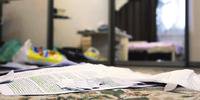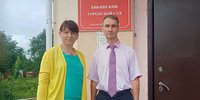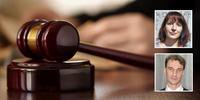The Case of Kazakov and Mirgorodskaya in Bikin
Filter
- #
N. E. Yakimov, an investigator of the Vyazemsky Interdistrict Investigation Department of the Investigative Committee of the Investigative Committee of Russia for the Khabarovsk Territory and the Jewish Autonomous Region, initiates a criminal case against Sergey Kazakov under parts 1 and 2 of Article 282.2 of the Criminal Code of the Russian Federation (organization of extremist activities and participation in them).
Also, a criminal case under Part 2 of Article 282.2 of the Criminal Code of the Russian Federation for participation in the activities of a banned organization was initiated against Olga Mirgorodskaya and other unidentified persons.
- #
The criminal cases against Sergey Kazakov and Olga Mirgorodskaya are combined into one proceeding.
- #
The investigation of the criminal case is entrusted to the Second Department for the Investigation of Especially Important Cases of the Investigative Directorate of the Investigative Committee of the Russian Federation for the Khabarovsk Territory and the Jewish Autonomous Region.
- #
Since early morning in the town of Bikin and the village of Lermontovka, officers of the local FSB and the Investigative Committee have been conducting searches at 9 addresses. Believers' homes are infiltrated using various tricks. So, Olga Mirgorodskaya was knocked on at 6 am and asked to call an ambulance. She is later interrogated as a suspect.
Sergey Kazakov from Petropavlovsk-Kamchatsky, where he cared for his mother, who suffered a stroke, is taken to Khabarovsk for interrogation as a suspect.
- #
The judge of the Central District Court of Khabarovsk, A. V. Podolyakin, elects Sergey Kazakov a measure of restraint in the form of detention for 1 month and 20 days. Sergey was placed in pre-trial detention center No. 1 in Khabarovsk.
- #
Sergey Kazakov is transferred to house arrest. He spent 166 days in custody.
- #
Judge of the Central District Court of Khabarovsk Yaroslav Sidorov softens Sergey Kazakov's preventive measure: he releases the believer from house arrest and transfers him to a ban on certain actions.
- #
The criminal case of Sergey Kazakov and Olga Mirgorodskaya is submitted to the Bikinsky City Court of the Khabarovsk Territory. It will be considered by Denis Dneprovsky.
- #
During the preliminary hearing, Judge Denys Dneprovsky decides to return the case to the prosecutor's office, since "the indictment was drawn up in violation of the requirements of the Code."
- #
The Khabarovsk Regional Court cancels the decision of the Bikin City Court to return the case of Sergey Kazakov and Olga to the Mirgorod prosecutor and sends it back for reconsideration by the same court.
- #
The criminal case against Kazakov and Mirogorodsky is again submitted to the Bikin City Court for reconsideration under the chairmanship of Judge Denis Dneprovsky.
- #
The first court hearing is held in the Bikinsky City Court of the Khabarovsk Territory under the chairmanship of Judge Denis Dneprovsky. The public prosecutor reads out the main provisions of the indictment. The defendants tell the court that they do not plead guilty.
Sergey Kazakov speaks with an attitude to the accusation. He claims that this criminal prosecution is illegal, since the prosecution did not provide facts that he organized the activities of the liquidated organization or participated in it. He also says that he has never supported views of an extremist nature and is a deeply religious person. "In order to be one of Jehovah's Witnesses, there is no need to be a member of any legal entity," Kazakov said.
- #
The defendants Kazakov and Mirgorodskaya filed motions to refuse the assistance of the appointed defenders, but the judge refuses them.
The Court informs that the information about the death of one of the witnesses has been confirmed. The state prosecutor petitions for the announcement of the interrogation of the deceased witness, and the judge, despite the protests of the defense, grants this request. The rest of the witnesses do not appear at the hearing.
- #
A witness is interrogated, who reports that he is unfamiliar with the defendants and does not feel hostile feelings towards them. He expresses his personal opinion on the organization of Jehovah's Witnesses. When asked whether the witness at the meeting of believers, which the interrogated attended several years ago, heard calls for violence, racial discrimination, etc., he replies that he does not remember such a thing. At the request of the prosecutor, the testimony of a witness shall be read. He cannot explain why his testimony at the preliminary investigation and his testimony in court contradict each other.
Another witness is being questioned. According to him, he saw the defendant Kazakov only once, but he does not know him personally, he does not have any negative feelings towards him. He says that her co-religionists came to his mother, sang songs, praised God, they did nothing bad or forbidden.
A witness who lives near Olga Mirgorodskaya is being interrogated. The witness says that she has never heard speeches from the defendants insulting people of other religious views, dissatisfaction with the government or calls for violence. The witness described the defendant Mirgorodskaya as a calm, family-friendly, kind woman.
FSB officer K.V. Fomin, who participated in the operational-search activities in this criminal case, is being interrogated. During the ORM, Fomin revealed that the defendant Mirgorodskaya invited fellow believers to her home, where they watched videos and used the Zoom program to communicate with Kazakov. The Witness confirms that the Supreme Court did not prohibit Jehovah's Witnesses from holding worship services.
- #
The last witness is being questioned. Answering the judge's question, he says that he does not personally know the defendants. The state prosecutor asks the witness questions about whether he attended meetings, whether he knows how donations were collected, and other questions about the organization of Jehovah's Witnesses.
The prosecutor files a motion for the disclosure of the preliminary testimony of the witness, since the testimony given in court contradicts them. The judge grants the request and the testimony is read.
The judge announces that he is moving to the stage of studying the materials of the criminal case.
- #
The court shall consider the materials of volumes 2-4 of the case. Lawyers draw attention to the discrepancy in one of the documents and ask not to consider protocols and certificates that are not directly related to the case or drawn up with violations of the Code of Criminal Procedure.
11 people come to support the believers, but due to the epidemiological situation, only six are allowed into the hall.
- #
The 6th volume of the case materials is being examined. Commenting on the expert's opinion on the audio recording of the worship service, the lawyer emphasizes that there are no actions or calls of an extremist nature on the recording. Discussing the Bible with friends is legal and not propaganda.
The defense also speaks of the irrelevance of the expert's conclusions. For example, he assesses a simple dialogue between women about raising children as a religious activity. In addition, the examined case materials contain inadmissible evidence.
- #
Volumes 7, 8 and 9 of the case are examined. The defense repeatedly draws attention to the groundlessness of the conclusions of expert opinions and emphasizes that the meetings of believers are not a continuation of the activities of any prohibited legal entities.
- #
The court is examining the 10th volume of the case, which contains, among other things, an audio recording of a meeting with friends in Olga Mirgorodskaya's apartment.
Lawyers Kazakov and Mirgorodsky draw the court's attention to the fact that, according to the Federal Law "On Operational-Search Activities", operational measures are possible only by a court decision. No such order was granted. In this regard, the defense believes that the rights of the defendants were violated, since the audio recording was made without the knowledge of the owner of the premises.
Also, Olga's lawyer notes that the organization cannot be a religion, he says: "It is impossible to be a supporter of religious teachings in the form of an organization."
- #
The hearing takes place in the judge's office, there are no places for listeners.
The defendants file a petition for the admission of listeners to the court session. The judge grants the request.
- #
The hearing is again held in the judge's office, as the hall is occupied.
The Prosecutor has finished presenting the prosecution case. The defense asks for time to prepare the testimony of the defendants. The judge agrees.
- #
The court rejects Sergey Kazakov's request to return the criminal case to the prosecutor.
- #
Kazakov and Mirgorodskaya voice their testimony and answer questions.
- #
The court satisfies the defense's requests for the full disclosure of the documents submitted by the investigation as an accusation.
After the announcement, the judge also granted the lawyers' request to listen to audio recordings of meetings of believers in Mirgorodskaya's apartment.
- #
The prosecutor asks for Sergey Kazakov 6 years and 2 months in a penal colony and additional restrictions after serving his sentence, and for Olga Mirgorodskaya — 4 years of suspended sentence and additional restriction of freedom.
The debate of the parties is taking place.
The defense is petitioning for the study of documents containing an addendum to the testimony, as well as for the invalidation of the religious examination of the historian Maria Serdyuk, who became notorious for her conclusions violating the rights of the defendants, and for the appointment of a new examination. The judge, without retiring to the deliberation room, refuses to satisfy.
- #
- #
In the Khabarovsk Regional Court, the appeal hearing of the appeal against the verdict of the first instance begins. Olga Mirgorodskaya's lawyer is filing a motion to challenge the presiding judge Vladimir Bykov, since, according to the lawyer, he participated in the trial in the court of first instance. The board refuses.
Sergey Kazakov draws the court's attention to the fact that the verdict imputes to him the religious beliefs of Jehovah's Witnesses, but not specific illegal actions related to extremism.
Olga Mirgorodskaya says that her actions and statements were exclusively peaceful and lawful and that her religious affiliation with Jehovah's Witnesses is not a crime.
Sergey Kazakov's lawyer asks the court to declare his client innocent, since, in his opinion, there is no motive and signs of a crime in the case. Mirgorodskaya's defense asks for an acquittal or a reduction in the amount of the fine.
The prosecutor objects, referring to the fact that such a penalty is the minimum under this article. The appeal hearing is adjourned.
- #


